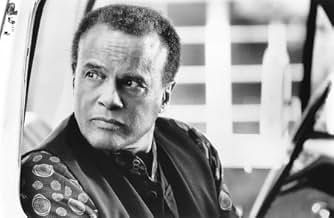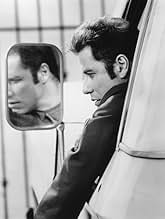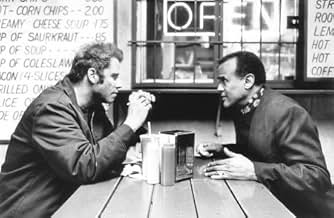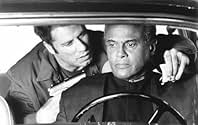Füge eine Handlung in deiner Sprache hinzuIn an alternative America where African-Americans and White Americans have reversed cultural roles, a white factory worker kidnaps a black factory owner for dismissing him over perceived dis... Alles lesenIn an alternative America where African-Americans and White Americans have reversed cultural roles, a white factory worker kidnaps a black factory owner for dismissing him over perceived disdain.In an alternative America where African-Americans and White Americans have reversed cultural roles, a white factory worker kidnaps a black factory owner for dismissing him over perceived disdain.
- Sheriff #1 at Eviction
- (as Lawrence Mandley)
Empfohlene Bewertungen
From the opening I felt chills. Was this chocolate factory scene, brown being poured on top of white, some horribly clumsy use of imagery? I feared so. The film looked set to be heavy-handed, and it was. The movie's flaw is that it over-does it's premise - nearly all the white people are poor and rundown, while all the black people come across as elitist snobs. The underlying message of course being that in "our reality" the situation is reversed and this gives a horribly, simplistic, and downright irritating attitude towards race. It's completely simplistic and infuriating - not because you're angered that it's right but because it's done so poorly and with a preachiness that grates.
It might all be OK if there was a story to support it. There isn't. Reeking of TV movie-of-the-week, John Travolta is playing a desperate factory-worker who kidnaps his ex-boss in a bid to get the money he lost from being fired unfairly. *Yawn*. There's no suspense and no tension in their scenes. There's the boring, trite situation where the boss, played by Harry Belafonte, starts to understand Travolta's cause. Far too obvious in coming. There's even the hilariously poor moment when Belafonte's son takes home a white girl to a look of distaste from his mother - bang that message-hammer on our heads Mr Nakano (the script writer). I'm reminded of a moment from "Don't Be a Menace to South Central While Drinking Your Juice in the Hood" when the character is similarly preachy and the postman turns to the screen and says "Message!" pointing out how morale messages are weakly delivered. In fact the only decent bit is about two minutes from the end, and even that's ruined by the (incredibly) obvious follow-up final minute. *Yawn*.
Travolta does nothing for this picture. This film was released after his sudden re-emerge in "Pulp Fiction", but I imagine he made it while still wandering around the Turkey Farm. His performance is as forgettable, as is usual with him and Belafonte is just OK.
Nothing can make me recommend this piece. If you want a movie about race issues why not watch the infinitely superior "American History X". This movie has a dreadful plot, weak acting, and destroys a promising premise by being both heavy-handed and insultingly simplistic. Avoid. 2/10.
Nonsense.
This movie is misinformed racewise. There are plenty of rich blacks and poor whites in this world. Turn it on Cops or any talk show and you'll see proof of the latter. To give us a morality play with the intent to shock us with things a lot of us in middle America see on a daily basis is lazy conception.
The movie fails on this level. Perhaps if it gave more thought to the classes instead of just using the race card (and actually looking more into their topic) it would be a good movie. But now, it's just a forgotten piece of tripe with a very limited and selectively cynical view of the world. And the world is lesser for it.
The film ultimately left me frustrated because I thought the idea was a good one but the story simply wasn't multi-faceted enough to be engaging. Aside from the characters played by Travolta and Belafonte, most of the supporting cast was very underwritten, particularly the families of both men. However, the performances were very good, and I thought Belafonte conveyed the defeatism and inherent arrogance of his role particularly well.
Overall though, I thought this was pseudo-art: it masqueraded as a deep and meaningful examination of the social relevance of race, but ended up as a very simplistic story disguised by delusions of self worth.
5/10
Wusstest du schon
- WissenswertesQuentin Tarantino urged both John Travolta and Kelly Lynch to act in the film. Tarantino's production company, A Band Apart, produced the film.
- PatzerAlle Einträge enthalten Spoiler
- Zitate
[Last lines. Mrs. Pinnock has just refused to accept from Mr. Thomas the money he owed her husband]
Thaddeus Thomas: Why don't you keep it? I can give you some more if you think... if you think it's not enough.
Marsha Pinnock: How much is enough, Mr. Thomas? How much will ever be enough?
[turns, shuts the door and walks away]
Top-Auswahl
- How long is White Man's Burden?Powered by Alexa
Details
- Erscheinungsdatum
- Herkunftsländer
- Sprache
- Auch bekannt als
- White Man's Burden
- Drehorte
- Southern California, Kalifornien, USA(Location)
- Produktionsfirmen
- Weitere beteiligte Unternehmen bei IMDbPro anzeigen
Box Office
- Budget
- 7.000.000 $ (geschätzt)
- Bruttoertrag in den USA und Kanada
- 3.734.870 $
- Eröffnungswochenende in den USA und in Kanada
- 1.743.251 $
- 3. Dez. 1995
- Weltweiter Bruttoertrag
- 3.734.870 $
- Laufzeit1 Stunde 29 Minuten
- Farbe
- Sound-Mix
- Seitenverhältnis
- 1.85 : 1
Zu dieser Seite beitragen





































